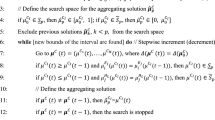Abstract
Analytical methods are proposed for solving fuzzy linear system of equations when the composition is max-product. These methods provide universal algorithm for computing the greatest solution and the set of all minimal solutions, when the system is consistent. In case of inconsistency, the equations that can not be satisfied are obtained.
Similar content being viewed by others
References
Aho A, Hopcroft J, Ullman J (1976) The design and analysis of computer algorithms. Addison-Wesley, London
Cheng L, Wang P (2002) Fuzzy relational equations (I): the general and specialized solving algorithms. Soft Comput 6:428–435
Bourke M, Fisher D (1998) Solution algorithms for fuzzy relational equations with max-product composition. Fuzzy Sets Syst 94:61–69
De Baets B (2000). Analytical solution methods for fuzzy relational equations, in the series:. In: Dubois D, Prade H (eds). The handbooks of fuzzy sets series. Kluwer, Dordrecht, pp. 291–340
Di Nola A, Lettieri A (1989) Relation equations in residuated lattices. Rendiconti del Circolo Matematico di Palermo, s. II, XXXVIII, pp 246–256
Di Nola A, Pedrycz W, Sessa S, Sanchez E (1989) Fuzzy relation equations and their application to knowledge engineering. Kluwer, Dordrecht
Garey M, Johnson D (1979) Computers and intractability. A guide to the theory of NP-completeness. Freeman, San Francisco
Grätzer G (1978) General lattice theory. Akademie-Verlag, Berlin
Guu SM, Wu Y-K (2002) Minimizing a linear objective function with fuzzy relation equation constraints. Fuzzy Optimiz Decision Making 4(1):347–360
Higashi M, Klir G (1984) Resolution of finite fuzzy relation equations. Fuzzy Sets Syst 13(1):65–82
Klir G, Clair U, Yuan B (1997) Fuzzy set theory foundations and applications. Prentice Hall, Englewood Cliffs
Loetamonphong J, Fang S.-C (1999) An efficient solution procedure for fuzzy relational equations with max-product composition. IEEE Trans Fuzzy Syst 7(4):441–445
Loetamonphong J, Fang S.-C (2001) Optimization of fuzzy relation equations with max-product composition. Fuzzy Sets Syst 118(3):509–517
Loetamonphong J, Fang S.-C, Young R (2002) Multi-objective optimization problems with fuzzy relation equation consrtaints. Fuzzy Sets Syst 127(3):141–164
MacLane S, Birkhoff G (1979) Algebra. Macmillan, New York
Markovskii A (2005) On the relation between equations with max-product composition and the covering problem. Fuzzy Sets Syst 153:261–273
Miyakoshi M, Shimbo M (1986) Lower solutions of systems of fuzzy equations. Fuzzy Sets Syst 19:37–46
Pappis C, Sugeno M (1985) Fuzzy relational equations and the inverse problem. Fuzzy Sets Syst 15:79–90
Peeva K (1992) Fuzzy linear systems. Fuzzy Sets and Systems 49:339-355
Peeva K (2002) Fuzzy linear systems – Theory and applications in Artificial Intelligence areas. DSc Thesis, Sofia, pp 239 (in Bulgarian)
Peeva K (2006) Universal algorithm for solving fuzzy relational equations. Italian J Pure Appl Math 9:9–20
Peeva K, Kyosev Y (2004) Fuzzy relational calculus-theory, applications and software (with CD-ROM). In the series Advances in Fuzzy Systems - Applications and Theory, vol 22, World Scientific Publishing Company, Software downloadable from http://www.mathworks.com/matlabcentral/fileexchange/loadFile.do?objectId=6214
Sanchez E (1976) Resolution of composite fuzzy relation equations. Inform Control 30:38–48
Author information
Authors and Affiliations
Corresponding author
Rights and permissions
About this article
Cite this article
Peeva, K., Kyosev, Y. Algorithm for Solving Max-product Fuzzy Relational Equations. Soft Comput 11, 593–605 (2007). https://doi.org/10.1007/s00500-006-0103-5
Published:
Issue Date:
DOI: https://doi.org/10.1007/s00500-006-0103-5




